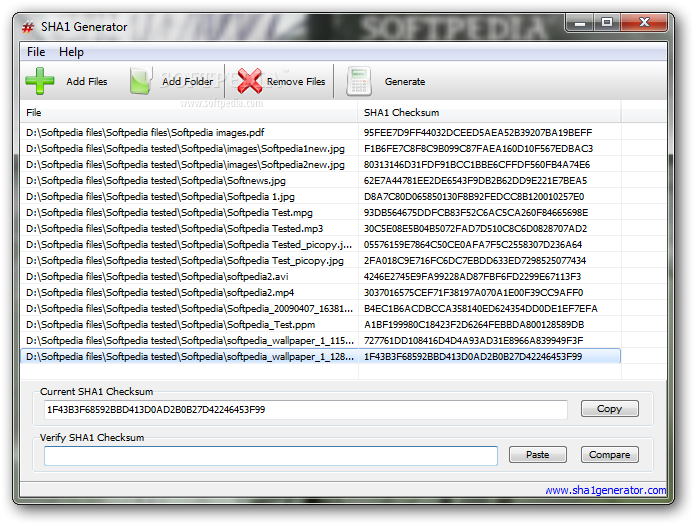
- ONLINE SHA1 HASH CALCULATOR ARCHIVE
- ONLINE SHA1 HASH CALCULATOR PASSWORD
- ONLINE SHA1 HASH CALCULATOR FREE
This value is under the section called “ Message digest. ResultsĪ window popup shows the hashed value of the entered string value. Step 3įinally, press the “ hash ” button to get the message digest. In our case, we choose the SHA1 algorithm. You can select either the MD5 or SHA1 algorithm. Step 2Īfterward, we select the type of hashing algorithm we want to use from the drop-down menu.

Let us take the case of entering a string, “password1.” Step 1įirstly, we need to ensure that the string you are entering is written correctly with no unwanted spaces and that the characters are properly entered. You can also find its hash value using this calculator checksum. You can use the calculator by entering any word or phrase in the single-line text box. Also, the hash value is unique and can change even if you capitalize one letter of the string entered. Moreover, this calculator does not give a hash value for the string “password” due to unknown circumstances. The input string can be of any size and can contain any word, but the message digest will always have a 128-bit size for MD5 and a 160-bit size for a SHA1 algorithm. The Checksum Calculator has a simple interface consisting of a single-line text box with a dropdown option between the MD5 and SHA1 hashing algorithms.
ONLINE SHA1 HASH CALCULATOR PASSWORD
Furthermore, the data stored can be used as a reference when the user enters the same password to access the server, and the hash value generated from that input is compared with the saved hash value. The Calculator Checksum is an online tool that creates message digest or hashes for a user input string, which is usually a password, to store in the server database. If it matches, the user’s password will be accepted. When the user enters the password again, it will generate the hash and compares it with the stored hash. password) is converted into a hash value, using either of the two hashing algorithms, and stored in the database. The MD5 generates a 120-bit hash value, and the SHA-1 generates a 160-bit hash value.Īdditionally, in the case of saving passwords or data, the string (i.e. The message digest can be generated using two different hashing algorithms, MD5 and SHA-1. It provides an integer form and a hexadecimal form of the hash value generated for the string. The Calculator Checksum generates a hash value (also known as a message digest) for the string value (usually a password) entered by the user.


ONLINE SHA1 HASH CALCULATOR FREE
(The first version had a bug in the argument checking.Calculator Checksum + Online Solver With Free Steps Here's a better version of the getDigestNotation() function I posted earlier. These functions eliminate the pesky problem of dictionary matches being run on your password lists To check a password run pw_check with the password attempt and the stored value, it'll return true on a match and false otherwise To encode a password run pw_encode with the password, it'll return a different pseudo-random string every time - store this value.
ONLINE SHA1 HASH CALCULATOR ARCHIVE
Getting Started Introduction A simple tutorial Language Reference Basic syntax Types Variables Constants Expressions Operators Control Structures Functions Classes and Objects Namespaces Enumerations Errors Exceptions Fibers Generators Attributes References Explained Predefined Variables Predefined Exceptions Predefined Interfaces and Classes Context options and parameters Supported Protocols and Wrappers Security Introduction General considerations Installed as CGI binary Installed as an Apache module Session Security Filesystem Security Database Security Error Reporting User Submitted Data Hiding PHP Keeping Current Features HTTP authentication with PHP Cookies Sessions Dealing with XForms Handling file uploads Using remote files Connection handling Persistent Database Connections Command line usage Garbage Collection DTrace Dynamic Tracing Function Reference Affecting PHP's Behaviour Audio Formats Manipulation Authentication Services Command Line Specific Extensions Compression and Archive Extensions Cryptography Extensions Database Extensions Date and Time Related Extensions File System Related Extensions Human Language and Character Encoding Support Image Processing and Generation Mail Related Extensions Mathematical Extensions Non-Text MIME Output Process Control Extensions Other Basic Extensions Other Services Search Engine Extensions Server Specific Extensions Session Extensions Text Processing Variable and Type Related Extensions Web Services Windows Only Extensions XML Manipulation GUI Extensions Keyboard Shortcuts ? This help j Next menu item k Previous menu item g p Previous man page g n Next man page G Scroll to bottom g g Scroll to top g h Goto homepage g s Goto searchĬheck out these randomized sha1 password storage functions, they output a string of 50 characters, the first 40 characters being a sha1 output based on the last 10 characters - those being a random seed


 0 kommentar(er)
0 kommentar(er)
